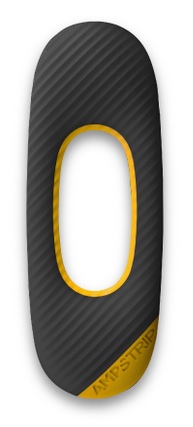 Nearly a year after announcing its direct-to-consumer fitness tracker AmpStrip -- and after raising more than $500,000 on Indiegogo for it -- Fitlinxx has announced that it will not be developing AmpStrip as a fitness tracker, but rather as a medical device. The company will refund all of its nearly 4,000 backers on request. Engadget first reported the news.
Nearly a year after announcing its direct-to-consumer fitness tracker AmpStrip -- and after raising more than $500,000 on Indiegogo for it -- Fitlinxx has announced that it will not be developing AmpStrip as a fitness tracker, but rather as a medical device. The company will refund all of its nearly 4,000 backers on request. Engadget first reported the news.
The news came in an update to the Indiegogo campaign that followed two months of silence from the company.
"After much discussion and debate, we have decided to suspend development of AmpStrip as a fitness product. Going forward, we are going to first focus on the device’s potential uses as a medical device rather than a fitness device. Many of you have commented on AmpStrip’s potential medical benefits, such as the ability for patients and doctors to monitor irregular heart rate, respiratory function and activity levels. We believe that in that capacity, this device can truly make a difference in people’s lives," Fitlinxx Head of Marketing Steven Schwartz, wrote. "Unfortunately, we do not currently have the resources to simultaneously support our previous athletic performance objectives and our current medical focus. For that reason, we will be unable to ship the AmpStrip at this time. We will be refunding everyone’s money."
AmpStrip was billed to consumers as a small patch that the user sticks on their torso that tracks heart rate, calories burned, respiration, body temperature, and posture. It's meant to stick to the skin for between three and seven days before the adhesive portion will need to be replaced, but the rechargeable battery on the device will last for more than seven days and charges in two to three hours.
The notion of AmpStrip as a direct-to-consumer device for fitness was a big part of it's intrigue. Adhesive monitoring sensors in healthcare are a fairly new category, but there are already several early attempts, including the Vital Connect HealthPatch, iRhythm's ZIO patch, and the Lifewatch Vital Signs Patch. When the company launched the campaign, they even drew attention to the D2C business model.
"This is our first foray into consumer products that we would sell directly — and we want to get it right,” they wrote on their crowdfunding campaign page at the time. “We know how to manufacture. We know how to distribute. We need your help to innovate even faster and take the AmpStrip to the next level.”
While it's not clear exactly what made Fitlinxx shelve the direct to consumer approach, they were doing extensive beta testing of the device in recent months, and posted blog posts detailing some of the challenges of working with an adhesive patch in the real world.
Digital health history aficionados will remember that BodyMedia announced a disposable patch in 2012, and still hadn't launched the device in 2013, blaming "some technical issues that we took some time to resolve" in an interview with MobiHealthNews. Jawbone bought Bodymedia shortly thereafter, and the patch never saw the light of day.














